10.13.23
An ashwagandha extract branded by Verdure Sciences as Witholytin was linked to significant improvements in perceived stress and fatigue in a clinical study published in the Journal of Psychopharmacology.
The extract, standardized to 1.5% withanolides, was compared against a placebo in a population of 111 men and women between 40 and 75 years old who reported moderate-to-high perceived stress, over a period of 12 weeks. The study tested a relatively low daily dose of 200 mg of the ingredient.
Those who took Witholytin saw 45.8% lower scores in the Chalder Fatigue Scale (CFS) and reductions of 38.6% in the Perceived Stress Scale, indicating that the ingredient could support an adaptogenic approach to combat fatigue and promote homeostasis and balance. Notably, overweight middle-to-older age adults who were experiencing high levels of stress and fatigue reported substantial improvements in perceived levels of energy.
In a sub-analysis of hormones and biomarkers, it was shown that men who took the ingredient saw an average 12.87% increase in blood concentrations of free testosterone, and significant increases in luteinizing hormone, compared to the placebo group. There were, however, no statistically significant changes in biomarkers or hormone concentrations.
Between-group differences showed that in the ashwagandha group, there was a 59.72% increase in estradiol concentrations over time, with a non-significant reduction occurring in the placebo group.
“We were very excited to see these hormone biomarkers,” said Kristen Marshall, digital marketing manager. “Many formulations targeting men and women have prioritized adaptogens, as have fortified functional foods and beverages, and Witholytin is well-suited to grow in these areas with this research.”
“We are excited to have this new publication join the evidence in support of Witholytin and our mounting body of evidence for ashwagandha extract standardization to USP methodology,” said Sonya Cropper, executive vice president. “Tremendous interest continues to build for ashwagandha, adaptogens, fatigue, energy, and mental vitality.”
The extract, standardized to 1.5% withanolides, was compared against a placebo in a population of 111 men and women between 40 and 75 years old who reported moderate-to-high perceived stress, over a period of 12 weeks. The study tested a relatively low daily dose of 200 mg of the ingredient.
Those who took Witholytin saw 45.8% lower scores in the Chalder Fatigue Scale (CFS) and reductions of 38.6% in the Perceived Stress Scale, indicating that the ingredient could support an adaptogenic approach to combat fatigue and promote homeostasis and balance. Notably, overweight middle-to-older age adults who were experiencing high levels of stress and fatigue reported substantial improvements in perceived levels of energy.
In a sub-analysis of hormones and biomarkers, it was shown that men who took the ingredient saw an average 12.87% increase in blood concentrations of free testosterone, and significant increases in luteinizing hormone, compared to the placebo group. There were, however, no statistically significant changes in biomarkers or hormone concentrations.
Between-group differences showed that in the ashwagandha group, there was a 59.72% increase in estradiol concentrations over time, with a non-significant reduction occurring in the placebo group.
“We were very excited to see these hormone biomarkers,” said Kristen Marshall, digital marketing manager. “Many formulations targeting men and women have prioritized adaptogens, as have fortified functional foods and beverages, and Witholytin is well-suited to grow in these areas with this research.”
“We are excited to have this new publication join the evidence in support of Witholytin and our mounting body of evidence for ashwagandha extract standardization to USP methodology,” said Sonya Cropper, executive vice president. “Tremendous interest continues to build for ashwagandha, adaptogens, fatigue, energy, and mental vitality.”




























